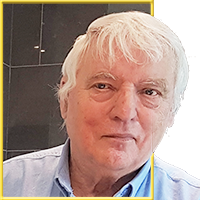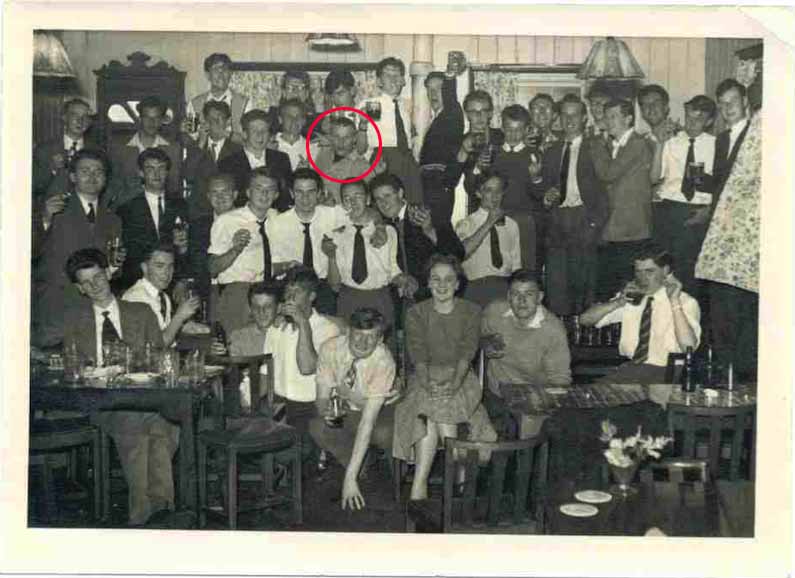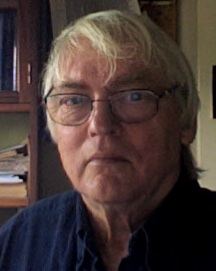


Peter Small's main education started in 1947, after winning a scholarship to a public school (Emanuel School, Battersea, London, U.K).
Having achieved success in the science subjects, he was chosen from hundreds of applicants to study at a new experimental college that had been set up by the Government within the top secret, Radar Research Establishment in Great Malvern, Worcestershire. Here he studied electronic engineering and computer design technology, specialising in systems and automatic control.

Peter Small - College of Electronics, Royal Radar Research Establishment, Great Malver, Worcs 1956
This was a five years course designed to train students to become the communication links between scientists and engineers in the newly emerging world of electronics, where computers were designed using thermionic valves with each bit of memory stored on a ferrite ring.
In 1971, after working for four years as a technical development engineer for an American machine tool company (The Gisholt Machine Tool Company), his career took a drastic change of direction when he left this company and was commissioned to author a correspondence course on finance and investment for a City of London finance company.
The course entitled "The Art of Investment" dealt with the fundamental, theoretical concepts underpinning finance, banking and investment. As it turned out, this proved to be essential knowledge for a would-be entrepreneur.
It was a great success and was recommended reading by the Stock Echange Council. This led to Peter Small becoming interested in entrepreneurship and the application of game theory to business strategies.
At first, his entrepreneurial business projects were based upon leisure activities (holiday companies, a gaming club and a discotheque), but then, after experimenting with a small retail unit in Kensington Market, selling antique clothing, he moved on to open “The Flea Market” in London's Carnaby Street.
From there he went on to open various types of shops in central London before becoming interested in fashion and, in the early 1980's, opened a design studio and a shop in Newburg Street called “Street Theatre” (Boy George worked in the shop and started his group “Culture Club” from there. See: http://www.carnabyechoes.com/map/#street-theatre). The success of this design studio (being regularly featured in the main fashion magazines), led to an approach by Topshop to open concessions within their stores.
Peter Small in the 1980's
The most remarkable point about all of these business adventures - and there were many others - was that they were started without any previous knowledge of the businesses or the business subject areas. They were started on a whim and relied solely on applying the theoretical concepts of finance and game theory together with systems and strategies associated with biological systems.
A few examples of these business strategies are explained here: Using biological strategies.
In the planning of these businesses in the 1980's, Peter Small was an early adopter of the computer (using an Apple 2 computer). So, when he moved to Maidenhead in 1988 he began to explore the possibilities that were opening up in the field of computing.
At this time, CD-ROMs had just been invented and he spent four years creating the first interactive CD-ROM book in the UK - the award winning “How God Makes God” - a treatise on game theory and its relationship to business and evolutionary biology. See: http://www.stigmergicsystems.com/stig_v1/cdroms/cdroms.html
Having had to learn programming from scratch for the CD-ROM project, he then wrote two books on computer programming: “Lingo Sorcery - the magic of lists, objects and intelligent agents (Wiley 1996)” and “Magical A-Life Avatars - a new paradigm for the internet (Manning-1998)”. These books were notable for their application of object-oriented techniques and using methods inspired by biological systems.
At this time, in the 1990's, the internet was starting to attract wide business interest and Peter Small was asked by The Financial Times to write three books on internet trading: “The Entrepreneurial Web - First,think like an e-business” (FT.com 2000), “The Ultimate Game of Strategy - Establishing a niche in the world of e-commerce (FT.com 2001)” and “Web Presence - Creating a business out of chaos" (FT.com 2001). See: http://www.stigmergicsystems.com/stig_v1/stigrefs/indexk.html.
During this book writing period, Peter Small became interested in molecular biology: first noticing that the human genome contained only about the same amount of information as a CD-ROM (approximately 3 million bits). The way in which DNA and RNA functions in the human cell has direct parallels with the way in which computer programs are design. This led to an interest in bots (small computer programs that act in a similar way to genes in a human cell).
Inspired by the way in which genetic structures within a human cell interact with each other, Peter Small began experimenting with bots and as a consequence was invited to deliver papers at three bot seminars in the United States: New York (2000), San Francisco (2001) and New York (2001). See copies of these papers at: http://www.stigmergicsystems.uk/stig_v1/papers/index.html
Tech Note:
Bots can interact with each other, manipulate, carry and exchange information between all kinds of systems and computer programs. More importantly, they can exist independently and outside of the restraints imposed upon algorithms and database constructs.
In 1996, Peter Small created a website with the purpose of furthering and exploiting the ideas which arose during the writing of the "Lingo Sorcery" book. Although written at a time when the internet was in its infancy, many of those ideas are still current today. In particular, it explains the concept of "bots" and their possible applications, especially in a client-side context. This is exactly how Peter Small's current project "Crowd-sourced Info Towns" has been designed to function. A copy of the 1996 webssite can be viewed at Here.
This led to working on an experimental project - concerned with group information sharing - for the Swedish telecommunications company, Ericsson. This was followed by consultancy work for Sanofi, a French, multi-national pharmaceutical company, on an information system for research teams working on cancer treatment trials.

Peter Small in the 2007
Still experimenting with various forms of communication strategies, Peter Small took an interest in virtual reality environments (notably “Second Life” See: http://www.stigmergicsystems.com/stig_v1/secondlife/index.html), which happens to be a perfect example of the biological self-organising system used by ants: known as "Stigmergy" (See: http://www.stigmergicsystems.uk/aboutstigmergy.html).
In helping his son, Elliot, to set up The Furniture Recycling Shop in Bourne End, Buckinghamshire, Peter Small became familiar with the world of auctions and the huge variety of different kinds of people who were selling items online.
Exploring the possibilities of ecommerce, it became apparent that the biggest problem to be faced was being able to get noticed - a problem common to all manner of web based enterprises. This led to the idea of developing a stigmergic type system of specialised resource centres, which could self organise and evolve to become useful focal points on the web for specific niche interest groups.
Tech note:
This idea was enhanced when the internet was viewed in the context of a multi-dimensional, Hilbert space, where exceptional web-sites can be discovered and grouped together using crowd-sourcing overseen by curators.
This has now progressed to a fully functioning model, which uses the analogy of islands, towns, streets and buildings to arrange a spatial organisation of websites into specific subject areas. This venture launched in September 2018.
A description of this current project - named "Crowd-sourced Info Towns" - can be seen at The Crowd-sourced Info Towns Project, with a technical background to the project explained on Peter Small's website: stigmergicsystems.uk.
Peter Small is now living in Bracknell, Berkshire, uk
Contact Peter Small at: peter@petersmall.com

Peter Small in 2018
Much of the details of the various projects Peter Small has been working on is recorded on his Stigmergic Systems website.
The site map has links to much of the thinking behind Peter Small's business strategies and methods of cooperation and collaboration. Below are a few links to this site, which are particularly relevant to the new project, which is based upon the idea of creating complex systems through an evolutionary process known as stigmergy.
Growing rather than planning a business.
Strategic considerations for a business start-up.
These articles come from the three E-Business books Peter Small wrote for the Financial Times. The text of the draft chapters of these book are on the stigmegicsystems.com website (see below). Although written nearly twenty years ago they contain ageless conceptual models, which view business strategy, communication, collaboration and cooperation from the uniquely different aspect of game theory.
For a deeper understanding of some of the principles involved in the new project, the following two articles may be of interest (written as part of a new book Peter Small is working on).